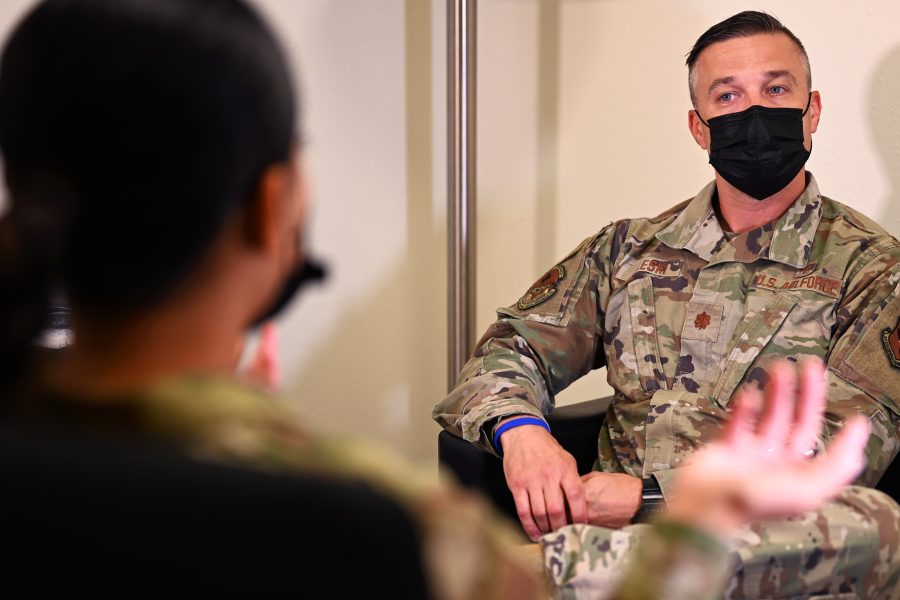Airman and Guardians seeking mental health care have access to a new referral system intended to accelerate accesss, the Department of the Air Force announced Aug. 7.
Under the new system, made possible by the Brandon Act, signed into law last December, service members can request a mental health referral for any reason by notifying their commander or an enlisted supervisor at the E-6 paygrade or higher. Commanders or supervisors must immediately contact the mental health clinic and request an appointment for the member by the following day, according to an Air Force release. Appointments can be in-person, online, online, or over the phone.
Detailed of the Brandon Act “Commander/ Supervisor Facilitated Referral Program” first appeared in a memo posted to the unofficial Air Force amn/nco/snco Facebook page. An Air Force spokeswoman confirmed the memo’s veracity to Air & Space Forces Magazine.
According to the July 28 memo signed by Secretary Frank Kendall, the program will be implemented in phases. Phase 1 applies to all Active-Duty service members, including Guard and Reserve members on orders of more than 30 days. Phase 2 applies to Guardsmen and Reservists on orders of 30 days or less.
Phase 1 is already implemented, the Air Force spokeswoman told Air & Space Forces Magazine. She said more guidance is needed from the Office of the Secretary of Defense before the Phase II can launch.
The memo states all requests for mental health evaluations referrals must be honored, regardless of impact on mission or location, and service members do not have to tell their commander or supervisor why they are requesting the referral, though the commander can speak with the member when they make their request.
There is no limit on the number of referrals a service member can ask for, and the results of the evaluation will not be disclosed to a supervisor unless there is a “safety, readiness, or duty concern,” the memo said.
The new program does not require Airmen and Guardians to go to their commanders to get mental health help—they are free to seek independent self-referrals on their own. And it doesn’t change commanders’ and supervisors’ ability to direct subordinates for mandatory evaluations.
All referrals under the Brandon Act must be fulfilled by a “privileged [mental health] professional,” according to the memo, not a chaplain or a military and family life counselor.
The Brandon Act is named after Navy Aviation Electrician’s Mate 3rd Class Brandon Caserta, who died by suicide in 2018. His parents were driving forces in crafting and passing the legislation through Congress, and undersecretary of defense for personnel and readiness Gilbert Cisneros Jr. signed a policy in May directing the services to implement the law.
“I spoke with the Caserta family and listened to their experience,” Kendall said in a statement. “They bravely shared the story of their son in hopes to help save others. We must honor their spirit and remind every supervisor and leader in the Air Force and Space Force of their duty and legal obligation to help fellow teammates who ask for assistance.”
“As leaders and supervisors learn about the Brandon Act, we hope it lifts the stigma that some have when asking for help,” said Patrick Caserta, father of Petty Officer Caserta. “Asking for help is an act of courage and mature judgement—in our call with Secretary Kendall, we believe we have the right leaders to help lead the change and improve our military and save lives. We want to thank Secretary Kendall for embracing and implementing the Brandon Act. We appreciate the hard work that he has and continues to do for our Airmen and Guardians.”
The Navy and Marine Corps announced they were implementing the Brandon Act last month. The Army has yet to announce that it has fully implemented a program.
Suicide prevention and mental health continue to be a pressing concern for the Air Force and Space Force, along with the rest of the military. Defense Secretary Lloyd J. Austin III implemented recommendations from an independent review committee this March, and the Department of the Air Force has a cross-functional team responsible to identify barriers to mental health and resilience for Airmen and Guardians.
